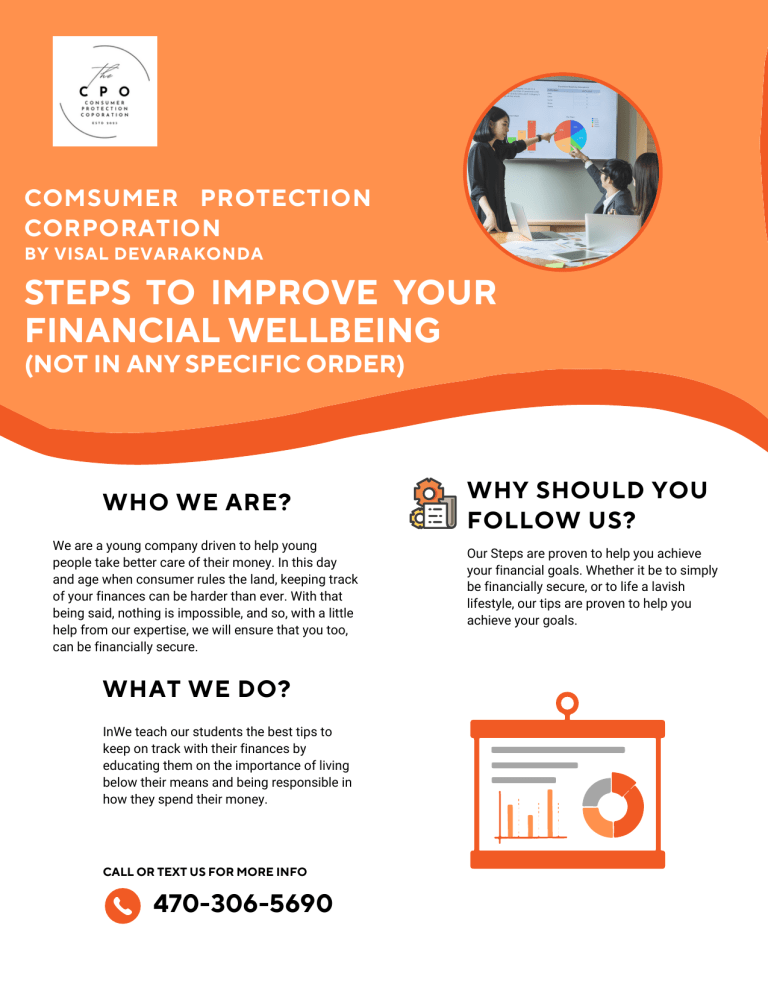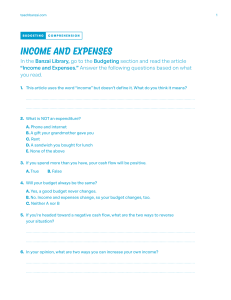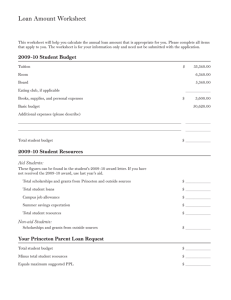
COMSUMER PROTECTION CORPORATION BY VISAL DEVARAKONDA STEPS TO IMPROVE YOUR FINANCIAL WELLBEING (NOT IN ANY SPECIFIC ORDER) WHO WE ARE? We are a young company driven to help young people take better care of their money. In this day and age when consumer rules the land, keeping track of your finances can be harder than ever. With that being said, nothing is impossible, and so, with a little help from our expertise, we will ensure that you too, can be financially secure. WHAT WE DO? InWe teach our students the best tips to keep on track with their finances by educating them on the importance of living below their means and being responsible in how they spend their money. CALL OR TEXT US FOR MORE INFO 470-306-5690 WHY SHOULD YOU FOLLOW US? Our Steps are proven to help you achieve your financial goals. Whether it be to simply be financially secure, or to life a lavish lifestyle, our tips are proven to help you achieve your goals. COMSUMER PROTECTION CORPORATION STEP 1: BUDGETING WHAT IS BUDGETING AND WHY IS IT IMPORTANT? Budgeting is the process of planning out all of the expenses and income for a certain period of time. For most people, this period would be monthly, as most people are paid twice a month instead of one lump sum a year. Regardless of the budgeting period, there are certain aspects that must remain the same. First, a budget must cover all expenses and incomes, with no stones left unturned. A budget allows you to plan out how much money you will receive and how much you will spend, and so if the figures on the budget are not accurate, the budget could prove less valuable than it can be. A budget should be organized in such a way that all of the expenses are clearly laid out so that there is no confusion as to where or how money was spent. While there are many different ways to budget, the best ways are the following: Writing down expenses in a notebook, or typing them on a google doc, using a spreadsheet, or using the many budgeting apps that are available online or on your smartphone. PIECE OF ADVICE #1 While keeping a budget is so important, it is understandable why many people in America choose not to do it. They fear a budget may restrict them from doing what they want to do. And you may feel the same, but one piece of advice is to still keep trying. When we are young, we often look for short-term things to make us happy, and it is only once we are older that we look back and have regrets. Having a financially secure life is one of the most rewarding things you can have as an adult, and without a budget, achieving it will be nxt to impossible. PIECE OF ADVICE #2 While you may be willing to budget, you may find that being disciplined, especially after never being so before, is especially difficult. If this is the case for you, one piece of advice would try to join up with other people. This could mean a spouse or even close friends. Just like how finding a gym partner is a great way to stay motivated, having the same for budgeting is a great way to stay motivated and keep working toward your goals. COMSUMER PROTECTION CORPORATION STEP 1: BUDGETING WHAT IS BUDGETING AND WHY IS IT IMPORTANT? Budgeting is the process of planning out all of the expenses and income for a certain period of time. For most people, this period would be monthly, as most people are paid twice a month instead of one lump sum a year. Regardless of the budgeting period, there are certain aspects that must remain the same. First, a budget must cover all expenses and incomes, with no stones left unturned. A budget allows you to plan out how much money you will receive and how much you will spend, and so if the figures on the budget are not accurate, the budget could prove less valuable than it can be. A budget should be organized in such a way that all of the expenses are clearly laid out so that there is no confusion as to where or how money was spent. While there are many different ways to budget, the best ways are the following: Writing down expenses in a notebook, or typing them on a google doc, using a spreadsheet, or using the many budgeting apps that are available online or on your smartphone. PIECE OF ADVICE #1 While keeping a budget is so important, it is understandable why many people in America choose not to do it. They fear a budget may restrict them from doing what they want to do. And you may feel the same, but one piece of advice is to still keep trying. When we are young, we often look for short-term things to make us happy, and it is only once we are older that we look back and have regrets. Having a financially secure life is one of the most rewarding things you can have as an adult, and without a budget, achieving it will be nxt to impossible. PIECE OF ADVICE #2 While you may be willing to budget, you may find that being disciplined, especially after never being so before, is especially difficult. If this is the case for you, one piece of advice would try to join up with other people. This could mean a spouse or even close friends. Just like how finding a gym partner is a great way to stay motivated, having the same for budgeting is a great way to stay motivated and keep working toward your goals. COMSUMER PROTECTION CORPORATION STEP 2: PAYING FOR COLLEGE HOW DO I PAY FOR COLLEGE? In the modern era, it seems more crucial than ever to have a college degree. As more and more jobs move away from on-the-job training, a college degree seems like the only way to get a job that pays a high wage while also not requiring one to get their hands dirty. With that being said, college is an expensive affair, and many may not have the funds necessary to attend college and get an education. However, as you will learn, there are many different ways to pay for college, and not all of them require taking money from your own account (at least not at first). There are 4 mains ways to pay for college, which we will discuss here: Saving: This is the most self-explanatory of the bunch. There are many ways to save for college, however, there is one method that most students use when trying to pay for college. Working a summer job is always a good idea when still in college, as it allows you to make a dent in your college and if you're lucky, pay it in full. The only real downside to saving is the fact that, as we stated prior, many decent-paying jobs require a college degree, which you do not have, and as a result, you may not be able to get a job that pays high enough to pay for your tuition. This is where the other methods come into place Grants: If you are part of a certain group, whether that be a minority group or one of low financial standing, you may be eligible to receive some grants to go to college. These grants will not be needed to be paid back unless you don't graduate, and as a result, are a great way to pay for college if you can receive one Scholarships: If you have some sort of merit, whether that be high grades, high standardized test scores, or many other merit-based qualifications, you may be eligible for scholarships. Scholarships can range from a few hundred dollars to a full-ride scholarship that pays for all of your years as a student. Attaining scholarships is not easy, but if you receive one, it can certainly be rewarding. Loans: The last method to pay for college is to use student loans. Student loans are a method that many students have used in the past few decades to pay for college. They include using federally backed loans to pay for college, and then slowly paying off the debt over the course of your career. Depending on your circumstances, this may be your only way to attend college. PIECE OF ADVICE #1 Do not underestimate the power of little scholarships. Often, many people opt to apply for the large full-ride scholarships and often neglect to look at the other smaller scholarships that are only a few hundred or thousand dollars. However, while the full-ride scholarships are very challenging to attain, the smaller scholarships are not, and very often these scholarships can add up to quite a formidable sum of money, and are more attainable than full-ride scholarships that have thousands if not millions of applicants. PIECE OF ADVICE #2 Be very careful with how you deal with student loans. Student loans cannot be removed by bankruptcy and so if you take a loan, it will stick with you for the rest of your life unless you decide to pay it off. Be very careful about what you study in college, since not all degrees have the same value in the marketplace and if you choose the wrong field of study, you might not be able to pay off your student loans and be stuck with them forever. COMSUMER PROTECTION CORPORATION STEP 3: BUYING A HOUSE WHAT IMPORTANT CONSIDERATIONS SHOULD BE MAKE WHEY BUDY A HOUSE? Buying a house might be one of the largest if the largest financial decisions you will ever make, so it makes sense to be cautious about how the process is done, especially if this is your first time. For most people, buying a house is not something as simple as buying groceries, instead, they must take up a loan (also known as a mortgage, to buy the house). The loan amount you receive from the bank is dependent on your credit score, as a result, the higher your credit score, the more likely you are to be approved for a loan and the larger loan you can take. However, the bank will not allow you to take a house completely on a loan. They will instead want you to put in some money of your own to ensure you are also invested in the property. This is known as a down payment. The larger the down payment, the less you will have to take up as a loan and the less you will have to pay off every month. This is amplified by the fact that every loan will have some interest that is placed on it, this can be a fixed conventional loan or a variable interest loan (where the interest rate can change). It is important to consider that just because the difference between an interest is only by a tenth, because of the magnitude of the loan you accumulate, one-tenth can add up pretty quickly. With that being said, there are ways that a lender can protect himself from people who do not pay their loans, this is known as Private Mortage insurance which can protect the lender if the borrower cannot make a payment. The bank also has the ability to foreclose a property. This means that if a person cannot pay his monthly payment for his house, the bank can claim the property for itself and sell it, often in an auction. Finally, once all of the processes are complete, you can finally close on the purchase. This is where you can incur closing costs, which are basically the costs associated with deed filing and lawyer fees. The closing costs can depend on the property and location so please make sure to check with a real estate agent to confirm what the costs are in your area. PIECE OF ADVICE #1 Pay as large of a down payment as you can muster. This, of course, has limitations, in the sense that you must not use your emergency fund to pay for a down payment. However, excluding this, the larger the down payment, the better it will be for you when you decide to purchase a home. That is because the smaller the loan you have, the easier it will be to be approved for a loan and the less interest you will have to pay on that loan over time. This can also help you pay off your loan faster. PIECE OF ADVICE #2 Be very careful as you how much house you decide to purchase. Do not make an emotional decision on a property. Find a property that you can afford that fits within your meticulous budget and does not exceed it. This can help you down the road should there ever be economic instability, when you don't have to stress about making a payment every month the same way you would if your monthly payment made a very large portion of your budget. COMSUMER PROTECTION CORPORATION STEP 4: HEALTH INSURANCE WHAT IS HEALTH INSURANCE AND WHY IS IT IMPORTANT? Health Insurance is one of the most important insurance for an American. Without health insurance, you may not be able to pay off your medical bills, and may devastate your finances. As a result, it is crucial to pay more medical insurance for yourself and your family. Most full-time employees are given health insurance by their employer, however, there if you are a part-time employee, or don't like the coverage that your employer is giving you, it may make sense to purchase insurance for yourself, however, it is important to note that if you chose to purchase medical insurance individually, it may cost more that if you were to receive it from your employer. It is also important to note that not all insurance policies are the same. Some insurance policies only cover catastrophic events, while others may cover monthly check-up expenses. There are a few terms you will need to know, however: Copay: A cost-sharing program where the insurance company pays for part of the medical visit and medication and you as the individual will pay the remaining portion Deductible: A amount that an individual pays before the insurer starts to make payments for a covered loss. Co-insurance: A form of cost-sharing that requires the insured to pay a set percentage of expenses after the deductible has been met Flexible Spending Account: Allows people to place a certain portion of their wages tax-free to pay for uncovered medical expenses. Cobra: Allows a person to remain under the employer's medical coverage for a specific amount of time as long as the person continues to pay. PIECE OF ADVICE #1 You want to have as large of a deductible as you can muster because the higher the deductible, the less you will need to take for your insurance. This means that you will not need to use your insurance as much as you would need to otherwise and therefore have to pay less premiums should you ever need to use your insurance PIECE OF ADVICE #2 Try to create a Flexible Spending Account as soon as you can. The reason is if you are in a position where your medical you are unable to pay your deductible or co-insurance payments, having a Flexible Spending Account will be a life saver (literally and figuratively) and can be used without paying taxes on your money. This can make it a very useful piece of security in the case of an emergency. COMSUMER PROTECTION CORPORATION STEP 5: PROTECTING YOUR FINANCES HOW CAN YOU PROTECT YOUR FINANCES? There are many ways that thieves can steal your identity. And they can do so for many different reasons. The biggest reason, however, is usually financial. Stealing one's identity allows criminals to take out loans and credit cards in your name, and allows them to steal money from you in the process. Thieves can do this in many different ways. A short list includes Dumpster Diving, Skimming, Phishing, Shoulder Surfing, Change of address, stealing, or computer hacking. Regardless of the method they choose, having your identity stolen could be devastating to both your and your family's lives. Thankfully, there are ways to protect against it. Here is a brief list of measures you can take to reduce your chance of having identity theft occur. Monitor your financial accounts closely, When paying online, make sure the company you're buying from has a secure payment system. Don't provide your personal information to people you don't know Lock your financial documents and records in a safe place Leave your Social Security and medical cards at home or in a secure place. Use secure networks when online Monitor your credit report regularly for fraudulent information As previously stated, these recommendations are not allencompassing, but do provide a good guideline of how to protect yourself. PIECE OF ADVICE #1 Do not get overconfident. While you may follow all of the recommendations to protect your information, that doesn't mean you can be lax about it. Criminals are always changing their methods so that they can steal from you, so it is important to always be vigilant and careful no matter where you are, and not let hubris get the better of you. PIECE OF ADVICE #2 If you are ever in a position where you think that your identity has been compromised, do not panic. The worst thing you can do in that situation is make an emotion decision that will only make your predicament worse. Instead, if you are put in that position, take a deep breath, and contact the proper authorities who can help you and ensure that your identity is recovered.


